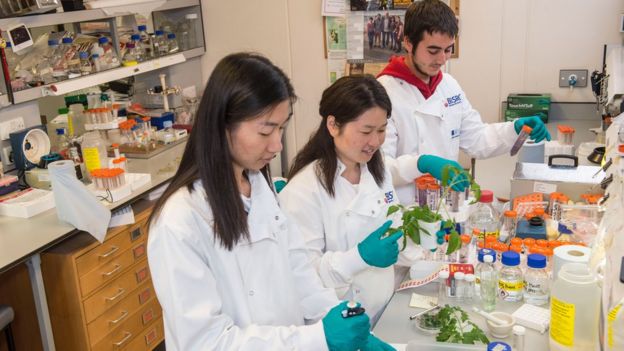Futures Forum: Brexit: and the future of the UK's life-sciences sector
Futures Forum: Brexit: and universities focussing on the post-exit world
Futures Forum: Brexit: and threatening the UK's research centres ... or: the 'catalyst' universities need to improve?
The scientific community is lobbying hard before the Autumn Statement:
What does UK science do about Brexit?
- 18 November 2016
- Science & Environment
 HALFPOINT
HALFPOINT
The scientific community was one of the main beneficiaries of membership of the European Union and now it stands to lose the most.
Ahead of the Autumn Statement - various scientific bodies, MPs and campaign groups have lobbied the government to ensure that the UK's world leading research base is not overlooked when the Chancellor sets out the government's financial plans next week.
The UK receives £850m in research funds from the European Union each year. Full membership of one of the main EU funding programmes requires free movement of labour. British universities employ 30,000 scientists with EU citizenship.
There have already been reports of UK scientists losing out in EU grant applications and of EU citizens not taking up posts in UK universities because of the uncertainty around funding and the residency status of EU citizens following the referendum result last month.
On the plus side, within days of becoming Prime Minister, Theresa May wrote to senior scientists to say that she wanted to ensure a positive outcome for science in negotiations to leave the European Union.
A few weeks later, the Chancellor, Phillip Hammond, said that the government would underwrite EU research funds obtained before the UK leaves the EU.
So there is not much more the government could have done to reassure the scientific community in the early days of the referendum result.
But now, research leaders want the warm words of the summer turned into firm commitments as the autumn chill of an uncertain future sets in.
Their concern is not just about the money. Free movement enables UK institutions to attract the best scientists from Europe. And the EU research funding system - which requires full members to allow free movement - enables collaborations with researchers from some of the leading labs in Europe.
UK research is among the best in the world. Without the free movement of European scientists the concern is that this great national resource, which enriches the country and benefits the economy, will slowly be diminished just as other nations are boosting their research efforts.
 JIC
JIC
At a meeting of the Foundation for Science and Technology this week at the Royal Society, senior scientific leaders were advised against whinging.
The former science minister, Lord Willetts, was not quite that blunt as he tactfully told them that unless they were seen to adopt a more constructive approach they would be in danger of being seen as privileged elite putting their own self-serving interests ahead of the wishes of many people in the country.
Smart lobbying
He gently urged them to be as smart with their lobbying as they are with their research and to play the government's game. As a first step, he said, the science community should make every effort to set up new collaborations with research groups outside Europe.
One of the government's top political priorities is to demonstrate that the country can thrive post-Brexit, so there is plenty of money and enthusiasm from ministers for projects with institutions in the US, China and Commonwealth countries.
Lord Willetts suggested that if researchers try their best to seize the new opportunities Brexit presents, two things might happen. First, they might be pleasantly surprised and get to be involved in some really good, well funded science. Second, according to the wily Lord Willetts, they would receive a more sympathetic hearing from government for the concessions they are seeking over Brexit.
Chief among these is an exemption for researchers from restrictions on free movement - both from the EU and from other parts of the world. If the research leaders can't get free movement for scientists - then they will seek a simpler, faster and less bureaucratic visa system for them. And the university sector wants to take student numbers out of the immigration figures - because if foreign student numbers are cut, British universities receive less money.
But any relaxation on immigration would be at odds with the government's stated aim of reducing numbers.
One chink of hope for many in the scientific community is that the government's much heralded industrial strategy might come to their rescue. No one knows quite what the strategy is - so at the moment it is whatever anyone wants it to be.
 SKA.AC.ZA
SKA.AC.ZA
Scientific leaders want it to be something that provides the political cover for government to be more flexible on immigration and a means by which they can get a huge cash injection.
A vibrant research base, they are telling ministers, could be the engine to the high tech, high skills economy that Mrs May has said she wants post-Brexit Britain to be. It would also present the optimistic narrative the government is seeking.
More money
So emboldened by the possibility of research being at the heart of the industrial strategy, four of the UK's national science academies and the Campaign for Science and Engineering (Case) called this week for the government and UK industry to make up for the possible loss of EU funding.
They also asked them to nearly double the amount of public and private money spent on research. The academies and Case want a increase from the current 1.7% of GDP to 3% by 2025. This would bring British R&D spending in line with Germany and increase the UK's annual combined public and private research spending from around £30.6bn to £52bn.
Such a boost in funding would be transformative, according to Naomi Weir of Case.
"It would boost confidence for inward investment, drive growth in the economy, see the creation of high quality jobs and increase our capacity to tackle national and global challenges in health, energy and the environment," she said.
The research community hopes it will get an indication whether the big increases in funding are on the government's agenda in next week's Autumn Statement. But the chair of the House of Commons Science and Technology select committee, Stephen Metcalfe, says he is "not convinced" that the needs of universities and the research community are at the heart of thinking at the department for exiting the EU.
To make the future of UK science more of a priority, the research community has to do something it failed to do during the referendum campaign.
It needs to reach out to those who felt left behind by our membership of the EU and make the case that it is important to them and their children for the UK to continue to have a vibrant research base.
What does UK science do about Brexit? - BBC News
.
.
.

No comments:
Post a Comment